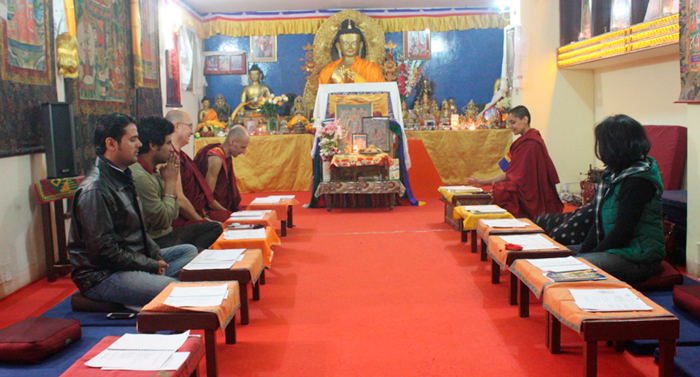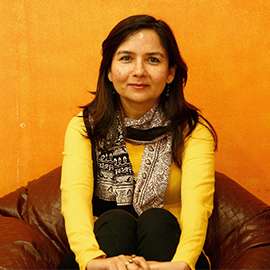The rise of Buddhism: why urban India can't get enough

Of the 360 million Buddhists around the world, 70,00,000 are in India. And for all the conversation about the rising tide of Hinduism, it's Buddhism that is really seeing a sharp rise in interest.
Blame it on urban malaise number one, rising stress levels. Or the increasing desire to be at peace with oneself. Or the open-door policy of Buddhism. Or, more accurately, a confluence of these factors, cutting across age groups, social strata and religions, that are making Buddhism one of the fastest growing religions in India.
Also read - Religion census data nothing but a political tool for Sangh Parivar
Niche, yet omnipresent
In a quaint East Delhi locality, a lawyer is home early on a weekday to perform 'Buddhist puja' for his ailing dog. He is certain the 'puja' will help heal the beloved family pet. In the same middle-class area, a Buddhist candidate recently registered an unprecedented win at an RWA election.
In the more upscale South Delhi, scarred women, harried men and wide-eyed students are frequenting Buddhist centres to make their passage on Earth more meaningful.
What makes such a disparate, disconnected group find solace in the same unfamiliar philosophy? Is it a fad or changing something at a more fundamental level?
Deciphering life

Twenty-something Benazir Khan was drawn to the Buddhist way of life some time last year, thanks to a close friend.
"We started talking about the practice and she said all you had to do was chant. There were no rules. You could be anyone. A purposeful religious identification wasn't important. I was in. I started chanting. And almost instantly felt free and drawn in. I could practice anytime and anywhere," says Khan. Then there's Uma Ukil, who went to a Buddhist centre 15 years ago. Her son was sick and she was "going mad" with stress. Her marriage was in trouble, too, and pujas at temples were not helping.
"I benefitted from the chanting. I found myself becoming a more positive person," says Ukil.
It's a sentiment that finds echo in person after person. Kavita Bhojwani tagged along with a Buddhist cousin to a session last year and was inspired by the stories of people whose lives were transformed by chanting. Their struggles. Their victories.
The simple philosophy, the focus on posititivity and the lack of rigid diktats seem to be the common threads spurring the interest in Buddhism on.
Reconciling religions
The other intriguing aspect of Buddhism - and a strong part of its appeal - lies in the ease with which it allows practitioners to retain their dominant religious identity even while adopting a new one.
Most of those adopting Buddhism are Hindus though followers from other faiths are not unusual.
Most find the transition from Hinduism to Buddhism easy - largely because Buddhism doesn't interfere with their existing belief systems.
That means it's possible to be part-Hindu, part-Buddhist. Even those conflicted at the prospect of changing their religion find it easy to see Buddhism as a philosophy rather than religion, since its beliefs don't contradict anything in their own religion.
For Bhojwani, Hinduism and Buddhism are "separate forces", even as she finds the pull towards Buddhism compelling.
"I go to Sai Mandir every Thursday to offer prayers. And I practice Buddhism on a daily basis. But I am more inclined towards Buddhism," she says.
Ukil, too, is a Sai Baba devotee. But she keeps a picture of him in a corner of a house along with her parents, who have passed away, while her practice of Buddhism is far more immediate.
Clearly, implicit in Buddhist practice is that it doesn't seem to require renouncing the religion you come from. That makes a crossover of beliefs not just easy but seductive.
To Dheeraj Nanda - who started chanting when his mother-in-law was diagnosed with cancer to make her remaining life as pain-free as possible - there's no conflict. "After all, Hinduism is all about spirituality. We Indians should understand Buddhism better than anyone else. I don't see a conflict," says Nanda.
What makes Buddhists tick
There's no one universal practice of Buddhism. Several schools of thought coexist, but the most popular amongst Indians seems to be the Bharat Soka Gakkai, with over one lakh people enrolled. Its appeal, perhaps, is in its simplicity - chanting "Nam Myoho Renge Kyo" for all ills.
Bharat Soka Gakkai has roots in the philosophy of Nichiren, a Buddhist monk who lived in 13th-century Japan and who proclaimed that the direct path to enlightenment was chanting the refrain above - vocally, audibly, constantly.
Gyalten Samten, who in another life was Barkha Madan, a finalist in the Miss India contest the same year as Aishwarya Rai and Sushmita Sen, explains the various strains of thought in Buddhism.
"Theravada and Mahayana are the two canons of Buddhism. The former aims at self-liberation, the latter enlightenment," says Samten, who became a nun three years ago.
The Buddhist centres that are gaining popularity in India endorse the Mahayana school of thought. Samten is in charge of the Tushita Mahayana Centre in South Delhi, which has over 1,000 members.
Magnetic effect
There's almost universal agreement that the practice of Buddhism makes these followers feel good - about themselves and their life.
In Khan's case, for instance, the Buddhist philosophy enamoured her at a time when she had an objective, but no clarity. "I think it happens to the best of us. Different things lure us is, things we often discover by pure instinct. We often don't know how those things will play out, but they feel worth pursuing because it feels good and soulful. In my case that was chanting. "
It was a life-changing experience for Ukil, too.
When the universe conspired against her - her son unwell, her relationship with her husband falling apart - chanting gave her peace and transformed her into someone with courage and strength, she says. Someone who could take on adversity with a smile and patience.
"I was diagnosed with Sjogren's syndrome, a rare auto-immune disorder, a couple of years ago. I did not let it bog me down. While patients with this disorder are bedridden, I refused to stay in bed after a while. I was up and about because I had to discharge my duties as a Buddhist. The duty of spreading cheer and happiness," says Ukil.
Bhojwani was also tackling the highs and lows of life when she stepped reluctantly into a Buddhist centre. She heard the members say that prayers never go unanswered.
"Everyone I met in these meetings was optimistic. I, too, started experiencing positive changes in my life. I don't think I'll ever quit practicing Buddhism," says Bhojwani.
That focus on positivity - how to feel better rather than an instruction manual of do's and don'ts, seem to liberate followers from the burden of anxiety and guilt we all seem to carry around. Traditionally, religion only feeds those burdens, wrapping solace in complex threads of ritual, so that to feel better requires sacrifice, self-denial, penance.
In the face of that, Buddhism seems liberating.
"Earlier when I'd face a big challenge my faith in God would waver. My newfound faith in Buddhism is making me positive. Stronger," says Bhojwani.
Doubters exist
Khan's friends and family found it hard to believe that she had found solace in chanting.
"My close friends found it hard to believe that I was doing what I was doing. That this chanting practice was really working for me, they were incredulous. I think it will always be the case, if you dare to choose something whose benefits you cannot quantify or demonstrate, but simply experience," she says.
Over time, though, most reconciled to her new beliefs. "One of them even told me that she was coming to terms with a whole other person and was happy to encounter her." Most of the others we spoke with had similar experiences; reactions ranged from dismissal to disdain. Ukil's husband, for instance, wasn't particularly happy when she started chanting. Over time, as the benefits that she was experiencing started reflecting in her changed outlook, that changed. While he does not chant himself, he now encourages her to.
Nanda was among the few who faced no resistance. He continues to take part in Hindu rituals, even though at heart he is more drawn to Buddhist practice.
All report feeling calmer, stronger, more in control of their emotions and therefore their lives. And each approaches the future with more positivity, even while days of feeling low naturally exist.
A material world
The conversation around Buddhism tends to become more complex when looked at through the filter of spiritually versus material comfort.
"If you do good and pray for the good for others, a good life is automatically yours. A life where you are both spiritual and material," argues Nanda.
Others find certain material aspects of Buddhism dissatisfying, such as the 'victory' speeches made by members after they have conquered a tough situation or challenge.
For Anun Dhawan, whose mother introduced him to Buddhism, it's all about the fundamentals: he has great faith in the practice, but avoids meetings with fellow-Buddhists. "I don't like talking about my victories," says Dhawan, a practice which has become a norm at most meetings.
There's a stream of believers who equate Buddhism with detachment - to them, material pursuits and comfort flout a basic tenet of the religion.
Samten isn't convinced. "Buddhist philosophy does not expect anyone to give up the material life. Everyone is entitled to a good life. It just wants followers to detach themselves."
For now, it seems like millions of urban Indians are happy to find a medium between the religion they were born into, and the one that speaks to them - especially because they're not being pushed into a corner and asked to choose. While other religions may battle it out for supremacy, we may already have the winner under our very noses.
More in Catch - The Hindutva view of India: one people, one culture, one religion. Hindi, Hindu, Hindustan! D Raghunandan
Putting religion aside, a young Muslim Radha celebrates the birth of Krishna







![BJP's Kapil Mishra recreates Shankar Mahadevan’s ‘Breathless’ song to highlight Delhi pollution [WATCH] BJP's Kapil Mishra recreates Shankar Mahadevan’s ‘Breathless’ song to highlight Delhi pollution [WATCH]](https://images.catchnews.com/upload/2022/11/03/kapil-mishra_240884_300x172.png)

![Anupam Kher shares pictures of his toned body on 67th birthday [MUST SEE] Anupam Kher shares pictures of his toned body on 67th birthday [MUST SEE]](https://images.catchnews.com/upload/2022/03/07/Anupam_kher_231145_300x172.jpg)






